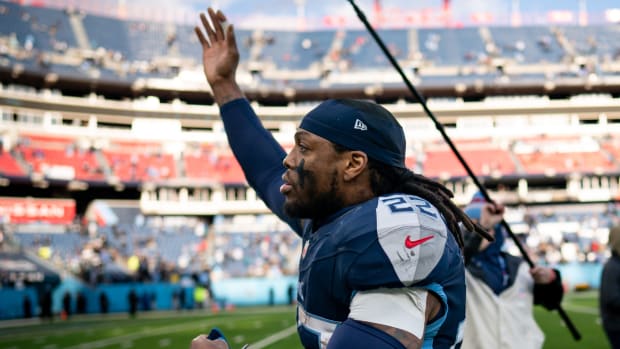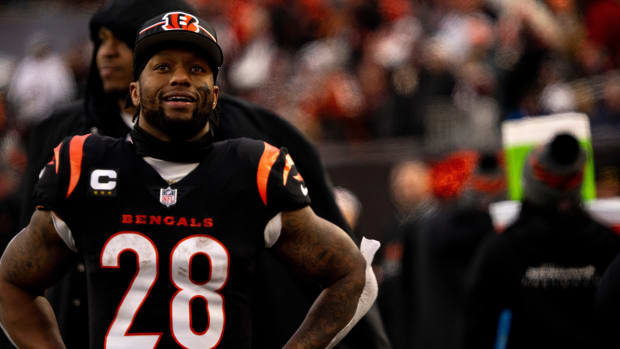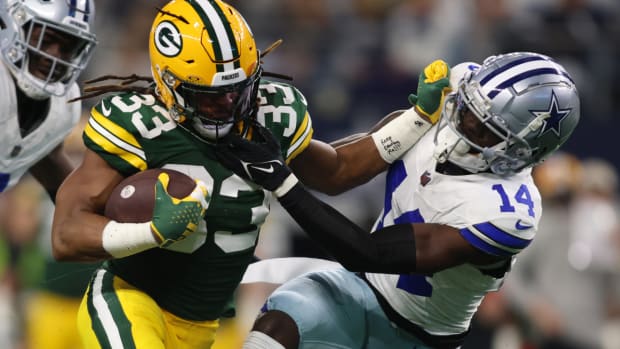Examining the implications of New York’s severe blow to DFS companies
Editor’s note: FanDuel is a sponsor of Sports Illustrated. This piece was pursued and executed independent of that business relationship. Sports Illustrated also has a partnership with DailyMVP, another daily fantasy sports provider.
In a significant blow to the daily fantasy sports industry, New York Attorney General Eric Schneiderman has determined that FanDuel and DraftKings are engaging in illegal gambling under New York Law. In sternly worded letters to the two leading DFS companies, Schneiderman demands that they cease and desist from accepting “wagers” in New York. Schneiderman justifies his conclusions and demands on his belief that DFS customers are “clearly placing bets on events outside of their control or influence, specifically on the real-game performance of professional athletes.” His letter sets the table for the State of New York to file a lawsuit against FanDuel and DraftKings.
FanDuel and DraftKings can continue to conduct business in New York at least temporarily, as they have five days under New York law to respond to Schneiderman (they can also continue to conduct business in states where daily fantasy sports games remain presumptively legal). Still, the mere threat of losing New York customers is highly damaging to these companies’ reputations and to their ability to persuade new fans to play. FanDuel is also headquartered in New York City (DraftKings is headquartered in Boston), which raises the possibility that Schneiderman’s efforts could especially disrupt FanDuel’s business operations.
Schneiderman portrays DFS as exploitative, unhealthy and illegal
In perhaps the most damning legal critique of daily fantasy sports to date, Schneiderman lambasts FanDuel and DraftKings as two unlawful gambling operations that masquerade as lawful fantasy sports companies. Schneiderman charges that Fan Duel and DraftKings “seriously mislead New York citizens about their prospect of winning.” According to research conducted by Schneiderman’s office, “a small number of professional gamblers profit at the expense of casual players” and “the top one percent of winners receive the vast majority of the winnings.” In essence, Schneiderman contends that DFS is a fraudulent scheme designed to dupe the public into losing its money on the false promise that it has a chance to win.
How a U.S. prosecutor's probe could spell doom for daily fantasy sports
Schneiderman also contends that daily fantasy sports games are structured substantially more like illegal gambling activities than are traditional fantasy sports games. For instance, Schneiderman cites the “instant gratification” promised in DFS television advertisements as consistent with promises made to gamblers. He also stresses that, unlike traditional fantasy sports companies, FanDuel and DraftKings “are in active and full control of the wagering.” Under this view, DFS customers merely roll the dice on the unpredictable real-time performance of athletes. Schneiderman even insists that DFS is a public health concern for New York citizens. He notes its adverse effects “for populations prone to gambling addiction and individuals who are unprepared to sustain losses, lured by the promise of easy money.”
Armed with these critiques, Schneiderman argues that DraftKings and FanDuel are in clear violation of the New York Constitution and New York Penal Law Section 225.00. Article I, Section 9 of the state’s constitution expresses “no lottery or the sale of lottery tickets, pool-selling, book-making, or any other kind of gambling, except lotteries offered by the state…” are allowable. Schneiderman posits that DFS games constitute a form of unpermitted gambling and thus are at odds with the state’s constitution.
As to Section 225.00, which I detail in a previous SI.com article, gaming contests are unlawful under New York law when chance is a “material” element. The word “material” is key: Even if DFS games are mostly about skill, they could still be considered unlawful under Section 225.00 if they involve a substantial or meaningful amount of chance. A court would ultimately need to make a determination on whether a “material” chance exists in FanDuel and DraftKings’ games.
Next steps in the New York legal process
As noted above, the companies have five business days to respond to Schneiderman if they wish to contest his determination. The two companies have already issued statements criticizing Schneiderman’s opinion and have implied that they intend to keep their DFS games active in New York. In the days ahead, expect the two companies to offer detailed statements that repudiate Schneiderman’s reasoning and conclusions. Schneiderman will then likely file a lawsuit on behalf of the people of New York against the two companies. He would demand that the companies be (1) permanently enjoined from violating relevant New York laws; (2) ordered to pay full monetary restitution to aggrieved DFS customers; and (3) required to pay the state substantial fines. In the meantime, the two DFS companies could petition a court for an injunction that would cast doubt on Schneiderman’s interpretation of New York law. Any injunctive relief would at least delay the carrying out of the cease and desist order.
DraftKings and FanDuel are not without legal defenses. The companies have long insisted that their games are mainly about skill, and thus do not constitute unlawful gambling. Along those lines, the companies maintain that winners of DFS games tend to be those that conduct research and are skilled—rather than those who happen to be lucky.
Broader implications of Schneiderman’s letters
While Schneiderman’s letters to FanDuel and DraftKings set the table for a legal battle between his office and the two leading DFS companies, the ramifications could be felt nationally. As a starting point, a handful of states have similar laws as New York whereby games found to have a “material” element of chance are considered forms of illegal gambling. These states include New Jersey and Nebraska and their respective attorneys general could adopt the same approach as Schneiderman.
Massachusetts could lead way in bringing DFS industry down to Earth
More significantly, a finding that FanDuel and DraftKings violate New York law would increase the odds that federal indictments are brought against DFS companies and their executives. As explained in a prior SI.com article, Preet Bharara, the U.S. Attorney for the Southern District of New York, has launched a probe into the relationship between DFS games and federal law. Of particular concern to FanDuel and DraftKings, when a violation of a state gambling law exists, the federal Illegal Gambling Business Act of 1970 (IGBA) permits indictments and accompanying prosecutions. As gaming attorney Daniel Wallach told SI.com, “a conviction under IGBA may sound the death knell for the DFS industry—it would allow the feds to seize assets, money and property, including the all-important domain names.”
Businesses that have entered into relationships with DFS companies should also be troubled by Schneiderman’s allegations against FanDuel and DraftKings. This is perhaps most true of professional sports leagues, such as the NBA, NFL and MLB, that have invested in DFS companies or entered into promotional agreements with them. These leagues—all of which are headquartered in New York City and thus within the jurisdiction of Schneiderman—are increasingly poised to reconsider their business relationships with DFS companies. Of greater concern, leagues’ executives could be dragged into the DFS legal dispute. Wallach, for one, predicts that sports leagues executives will face subpoenas. If so, these executives would be asked difficult questions under oath about their understanding of DFS games work and how these games are marketed to fans.
Michael McCann is a writer and legal analyst at Sports Illustrated. He is also a Massachusetts attorney and the founding director of the Sports and Entertainment Law Institute at the University of New Hampshire School of Law. This fall he is teaching an undergraduate course at UNH titled “Deflategate.” McCann is also the distinguished visiting Hall of Fame Professor of Law at Mississippi College School of Law and he teaches “Intellectual Property Law in Sports” in the Oregon Law Sports Law Institute. As a disclosure, one of McCann’s family members is represented in a personal matter by an attorney who represents a plaintiff in John Weaver v. FanDuel and DraftKings.




































